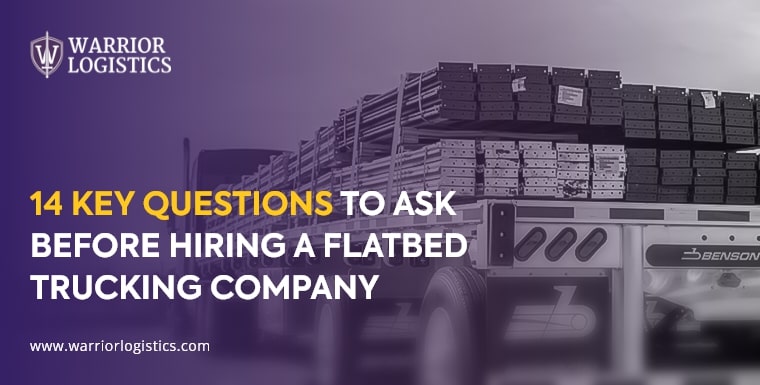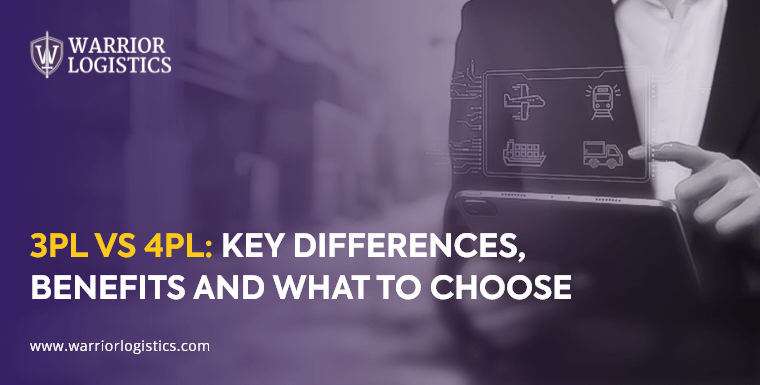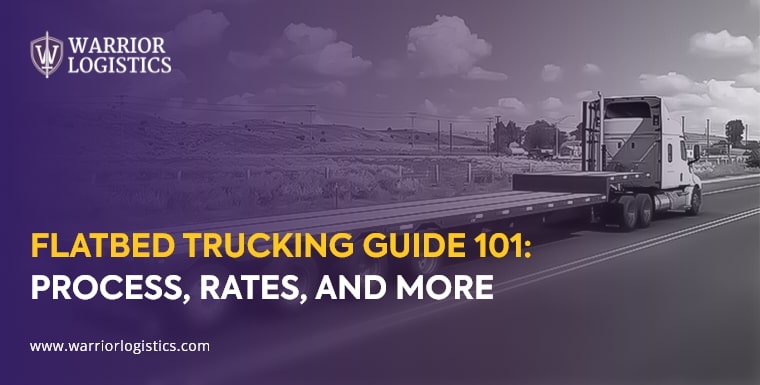14 Key Questions to Ask Before Hiring a Flatbed Trucking Company
Not all flatbed carriers are created equal, and your freight deserves more than guesswork.
Whether you’re moving steel beams, machinery, or industrial equipment, choosing who hauls it is a big decision. You need more than a truck driver with a license. You need a partner with precision, accountability, and a warrior mindset. However, it’s about freight forwarding services or flatbed.
Before you hire a flatbed trucking company, ask the questions that separate the pros from the rest. We’ve listed 14 must-ask questions to help you avoid delays, damage, and wasted dollars.
1. What Experience Do You Have with My Type of Cargo?
Experience counts. A company familiar with your freight type knows how to load, secure, and transport it safely. Hauling steel pipes isn’t the same as moving prefab walls. Ask for examples and past projects they’ve handled. The more relevant the experience, the better your outcome.
2. Are Your Drivers Certified and Licensed?
Don’t assume. Ask for proof of a valid CDL — Class A is typically required for flatbed work. Drivers should also carry endorsements if needed for specific cargo or routes. A qualified truck driver with a license is your first layer of safety. Ask how often licenses and certifications are reviewed or renewed.
3. How Do You Determine Flatbed Shipping Rates?
Flatbed shipping rates depend on distance, weight, route, and current demand. Ask for a detailed rate breakdown — no vague answers. In March 2025, national flatbed spot rates averaged $2.51 per mile. The Midwest topped the chart at $2.64 per mile. Be clear on surcharges, fuel costs, or accessorial fees that may apply.
4. What Safety Measures Are in Place for Load Securement?
Loose cargo is dangerous. Flatbed hauls require heavy-duty securement — chains, straps, edge protectors, and tarps. Ask how the company trains drivers and monitors securement practices. DOT violations can delay your shipment and damage your brand. Good carriers perform random securement checks and invest in driver refreshers.
5. Do You Offer Real-Time Tracking?
You can’t afford to wonder where your freight is. Ask if they offer GPS tracking or digital load visibility tools. Real-time updates help you stay ahead of disruptions and plan downstream tasks. Transparency gives you peace of mind and builds trust.
6. What Is Your Safety Record?
Safety stats speak louder than sales pitches. Request their FMCSA safety score and accident history. Low violations and clean inspection reports show a company that takes safety seriously. Look for a consistent pattern of safe performance, not just recent results.
Read our previous blog on truck driver safety tips.
7. How Do You Handle Permits for Oversized Loads?
Oversized loads come with paperwork — permits, escorts, and route planning. Ask who handles it. A reliable flatbed trucking company should manage this without delays or errors. Carriers should know how to navigate state-by-state permit requirements with zero guesswork.
8. What Insurance Coverage Do You Provide?
Flatbed loads are often high-value. Ask about their cargo insurance coverage and liability limits. Know exactly what’s covered — and what’s not. Unexpected damage or weather issues can happen, so coverage matters more than you think.
9. Can You Provide References or Testimonials?
Reputable carriers should have nothing to hide. Ask for recent testimonials or contact info for current clients. Direct feedback reveals how they actually operate under pressure. Ask about communication, timeliness, and how issues were resolved.
10. What Is Your Fleet’s Condition and Age?
Old equipment breaks. Ask how often trucks and trailers are serviced. Modern, well-maintained equipment reduces breakdowns and late deliveries. Preventive maintenance is a strong indicator of a disciplined fleet operation.
11. Do You Offer Additional Services?
You may need more than transport. Ask if they offer tarping, on-site loading, warehousing, or team driver options. Extra services can save time and simplify coordination. Look for flexibility, not a one-size-fits-all approach.
12. How Do You Handle Unexpected Delays or Issues?
What happens if a tire blows, a road closes, or a storm hits? Ask how they respond to real-world delays. Communication matters — especially when plans shift. You want a carrier who informs, not excuses.
13. Are Your Drivers Trained in Load Securement?
Flatbed hauling requires more skill than just driving. Drivers must know how to secure diverse loads legally and safely. Ask about their hands-on training and securement certifications. Proper load distribution and legal compliance protect everyone on the road.
14. What Is Your Coverage Area?
Some companies operate only regionally, while others go coast to coast. Make sure their service area aligns with your delivery zones. A wide network can save time and eliminate handoffs. Ask if they have trusted partners for extended reach.
Final Thoughts
Choosing a flatbed trucking partner isn’t about picking the lowest bidder. It’s about trusting someone to protect your freight, timelines, and reputation. The right company does more than move loads — they think ahead, act fast, and deliver without excuses.
At Warrior Logistics, we live by the Warrior Mindset — always alert, always accountable. We don’t settle for average, driving excellence in all we do. Ask the tough questions, demand clear answers, and choose a carrier that stands tall under pressure.
If you need one today, get in touch with us now.




